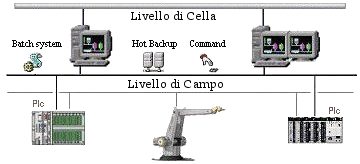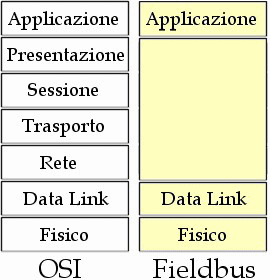|
In the modern systems of production management, several
devices employ for the automation, work to the inside of an informative system
that can be subdivided in hierarchical levels:
|

Level of planning
It's level where are plans the production orders, are prepared the strategies and
the lines guides of production, and are moreover place the production update control.
Level of process management
To this level it is decided if the production must have place and as coordinates
the works groups.
Level of cell
This level generally is constituted from a different number of cells of production, each one
normally controlled from a PLC.
Level of field
To such level the so-called equipment of field belongs, like the sensors and the actuators,
which allow to interact with the production processes.
|
Nets communication levels |
The nets of communication of the levels of planning and process management must satisfy
various requirements from those present ones in the levels of cell and field.
As far as the levels of planning and management the communication introduces substantially
the following characteristic :
- great amounts of data exchanged
- not critical communication temporarily
- immunity to disturbs adapted to the office atmosphere
- great extension of the net
- elevated number of nodes
The characteristics of the communication in the levels of cell and field are instead :
- amounts of data exchanged limited
- critical communication temporarily, requirement of real time
- elevated requirements of immunity to it disturbs in industrial atmosphere
- limited extension of the net
- medium small number of participants
|
Advantages |
|
The buses of field communication, or fieldbus, are optimize on the characteristics
of the levels of cell and field. They are been born in fact in order to connect the controllers
to sensors and actuators and therefore in order to manage the transfer of limited amounts of data
in times extremely reduced.
Some of the advantages deriving from the employment of fieldbus for the realization and a management
of the communication between device, are:
|
 |
- possibility to execute operations of device diagnostic calibration in remote.
- separation between the phase of data acquisition and data elaboration
, that it allows, to the every one single device, of being controlled or being replaced without to
influence the rest of the system.
- Increase of the immunity to the noise using digital transmission that it increases the quality relationship signal - disturbance.
- Facility to verify integrity of physical means, so as to to improve the reliability of the system.
- Every single data can virtually be available for all the nodes of the net with one the minimal effort; in such a way the multiple cable employment
is avoided when the information must be shared from different site.
- It is not necessary to add cables or to modify the topology of the net when device come introduced in the net.
|
The Fieldbus |
A bus of field communication must substantially satisfy following requirement:
- Cyclical deterministic transfer
- Urgent asynchronous traffic
- high level Messaging
|
One of the more important requirement, in the field atmosphere, is the ability periodically to
interrogate a different number of device whith one determined sequence, realizing therefore a cyclical
transfer of data. If the determined time in order to complete the sequence or the same sequence is
not respected the net it goes in error.
A connected controller point-point with sensors and actuators acquires signals and sendes commands to the
field in practically continuous way. If the connections are replaced point-point with a net of field communication,
this exchange data is realized for means of a cyclical interrogation (polling) that the net must be in a
position to realizing without to influence the operation of the controller. The effectiveness of this type of
transfer is seriously influenced from the time that elapses between two successive readings of one same variable
(jitter); a high value of jitter can reduce the accuracy of the control of the system, causing loss of precision
and instability.
|
In an automated atmosphere, where dangerous situations can rise, a device must be qualified to inform just the
controller more soon possible. In such sense the fieldbus they are in a position to managing determinist technical
urgent messages adopting of access with priority. It must moreover be possible synchronize a different number of
device on one determined event of alarm.
In any case it is asked the communication system to assure that the time that elapses between transmission and reception
of marks of alarm or synchronization, is limited.
|
In order to allow to the communication also with the level of cell the
fieldbus are based on systems of high level messaging. The greater part of they ago
reference to international standard MMS (Manufacturing Messaging Service). The services offers
from this system are generally:
- reading-writing variable (tag)
- loading-unloading of memory areas
- start-stop of programs on remote stations
|
Bus Architecture |
|
The standards fieldbus have been develop to holding in consideration the reference model
OSI. From the moment that an architecture to seven levels would be difficultly in a position to supplying requirement
of communication in real time, fundamental in the industrial atmosphere, have been adopted a reduced protocol,
substantially to three levels.
The levels are present only Physical, Link Date and Application, while the levels Net, Transport, Session and
Presentation have been eliminate.
|
 |
| Having reduced the levels of the communication model, some functions of the levels
eliminate that they turn out essential for the implementazione of the applications have been moved
in the two adjacent levels Data Link and Application.
|
